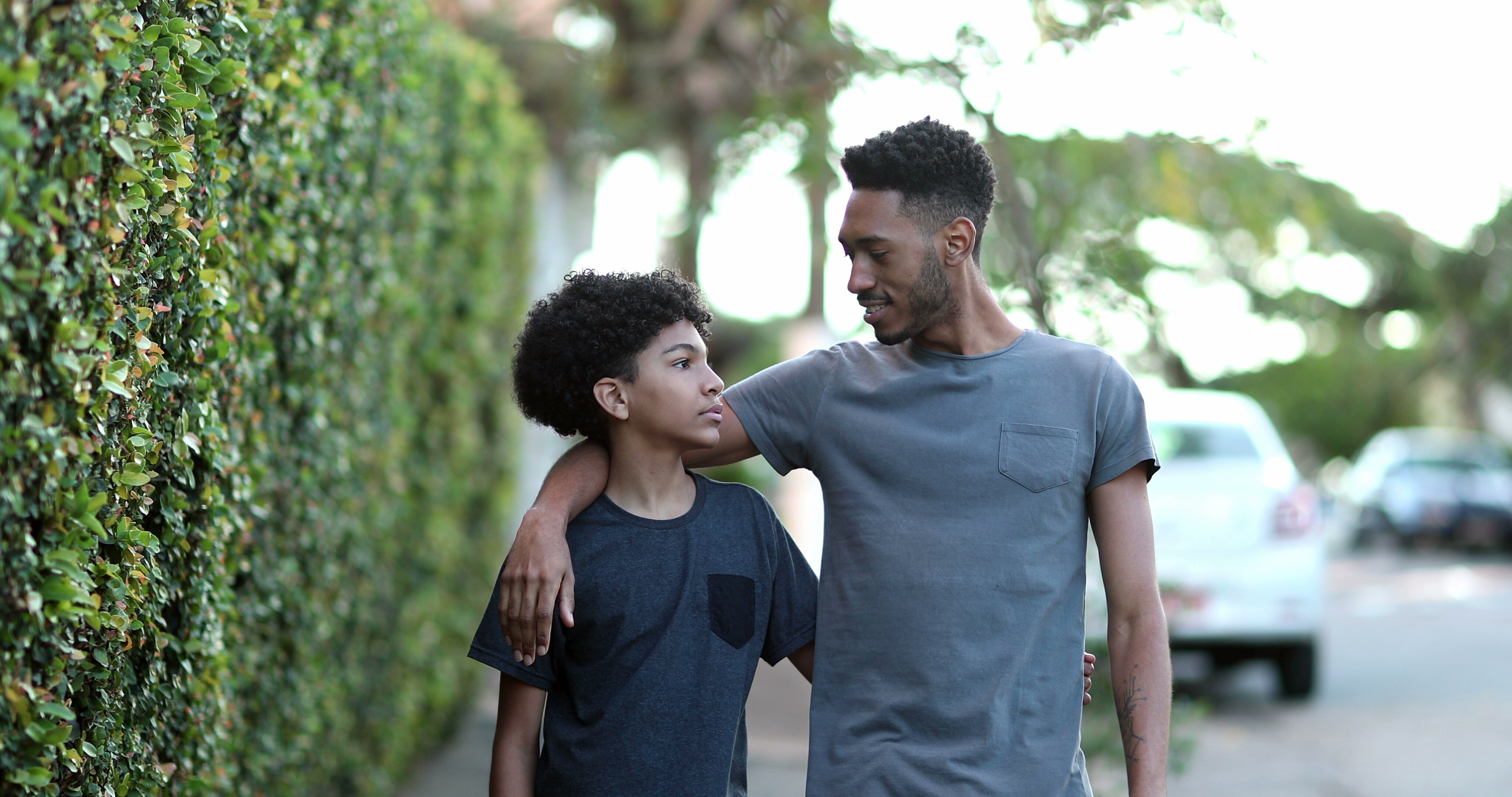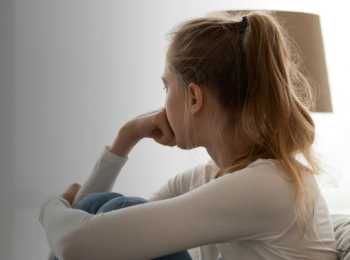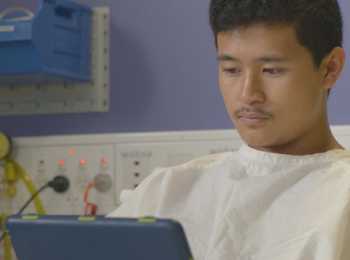Let’s talk about feelings
Every family will respond to cancer differently. It may change your relationship with your parent, or things may stay the same. Living with a parent who has cancer can affect your life in many ways such as changes to your expected routines and roles in the family.
How the changes affect you individually or changes things in the family will depend on several things, such as whether you’re living out of home or your position in the family.
Your relationship with your parent with cancer
As a young person, your relationship with your parent(s) is evolving. You could be at the stage where you’re becoming more independent and spending more time with friends. The challenges of cancer might mean you grow closer or drift apart from family members.
Try not to expect your family relationships to change overnight – if there were things you argued about before it doesn’t mean you will suddenly agree now that your parent has cancer.
When your parent has cancer, it’s easy for the diagnosis and treatment to become the focus of family life. You may feel they don’t have enough time or energy for you as they did, they may become forgetful when they’re undergoing treatment.
Seeing your parent sick, in pain, tired and maybe looking or acting different is going to be hard. You may feel guilty if you get angry with them or want to do things they don’t agree with or want to spend time doing other things like hanging out with friends.
Talking with parents about how you’re feeling about the cancer and the changes that have come along with it, may make things feel a little easier for you at home. While this isn’t always easy to do, it could help to give it a go.
Your parent may want you to talk to a health professional like a social worker, psychologist, or counsellor. Sometimes this can happen when the parent isn’t sure what is happening for their young person, parents can feel that they’re not hearing from their young person what is happening for them, the parents may be worried or unsure.
It can be hard to find words, or feel like you’re being listened to in families, but trying to explain what you are needing to your parent can be super helpful. This may mean that you do not want to see a counsellor, you just want to talk to your parent more, or you may think it may be just as helpful to start seeing somebody to talk about things away from your family.
Trying to find ways to communicate around love, trust and emotions in families is known to be very important things for families to try to work towards.
Support for parents
Your parents may be interested in checking out Canteen’s support services for parents.
Your relationship with your siblings
If you have a sibling, they might be an important source of support. They may be the only ones who really get how hard life is right now because they’re living it too.
Your sibling might be coping with your parent’s diagnosis differently to you and this could cause tension. If you never got along well with your sibling, the stresses of cancer may not change that. Some siblings find that the experience brings them closer together. However, just like the relationships with your parents, it is very individual what could happen, and each family is different.
You may have to take on some extra responsibilities with younger siblings, you may find yourself cooking more meals – you might be okay with this or find the change tough. They may also find it hard; they might feel like you’re becoming another parent.
Family planning done together around new roles and responsibilities may be something your family could consider doing (if not already).
Changes and stressful events can lead to families going back to old ways of doing things, it might be that your parent(s) could benefit from being reminded where you’re up to in life and what you are needing as a young person. We know that early teenage years is a particularly difficult transition times for families, where parents may still be parenting their child as a child- but the child is at an age where they want to become more of an individual.
If you’re older …
Your relationship with your parents has probably changed as you’ve gotten older.
You might feel like you now have more control of your life because you’re earning your own money, spending more time with your friends, and have moved out of home. You might enjoy the freedom of doing your own thing.
But a cancer diagnosis might mean your parent asks you to help around the house or look after younger siblings more than you previously did. It’s common to feel like you’re caught between your own needs and the needs of your family.
If your relationship with your parent was tense or distant before, their diagnosis can change the dynamics again. It’s tough to be expected to do more just as you’re starting to feel more independent.
It can also be that you are being expected to now take on too much, or you could start being seen as what is called a Young Carer. This basically means a young person who is taking a lead caring role in their family.
Support for young carers is available, there may also be adjustments that can be made in the family so that you’re not having to take such a lead role and you can get back to doing some of what young people do and not have to take a parent-type role in the family.
If not done in a way that is supportive of the young person’s needs as a young developing person, young carers are known to experience difficulties with attending school or financial challenges that other young people their age may not.
Friends, partners, and other family
The other important people in your life may provide great support, others may find the situation overwhelming. You might feel like your friends or partner don’t understand what you’re going through, your relationships may change or feel different.
How you may feel
Finding out your parent has cancer is likely to bring up a lot of different feelings for you. Some you may have expected, and others may come as a surprise. It may not always be easy to explain how you feel.
The main thing to remember is that there is no right or wrong way to feel.
Many young people describe the experience as an ‘emotional rollercoaster’ – you’re going through huge ups and downs and feeling like you have little control over things.
Common emotions other young people who’ve found out their parent has cancer include:
- feeling scared
- angry
- sad
- guilty
- jealous of others
- or lonely
Particularly when you first hear that your parent has cancer, it is important to know that you could experience something called Shock. Shock is a response in the body when a sudden illness or injury has been experienced, it can also be a mind--thing that happens when sudden or unexpected news is heard, and your brain and body becomes really overwhelmed.
Shock can include things like feeling shut off from reality or the world around you, it may lead to your heart racing fast, short breathing, or dizziness.
If this is something you had experienced when you first head about your parent’s diagnosis, it could be helpful to know that just because it’s happened once doesn’t mean it will happen again, it is just that your body got really overwhelmed when hearing the news.
If it happens again or returns, it could be something more anxiety related, and it could be helpful to start getting help with this through a mental health counsellor or psychologist through your GP. It could be something that a team member clinician at Canteen could also help with.
All these emotions are natural, and it’s common to feel differently from one moment to the next. If you think you’re ‘stuck’ in one, you could try talking to a Canteen clinician, by phone or face to face.
How your parent feels
It’s common for people to describe the days and weeks after the diagnosis as a whirlwind. Your parent is likely to have similar emotions to you, adult emotions are the same as young person emotions, however this may look differently from how you show emotions.
Knowing how other family members feel about the diagnosis could help you develop more understanding of what they are also going through. It can help for families to try to talk about emotions and to have understanding about how other family members show their feelings.
It is important to know that looking sad or crying may be a way that family members show how they are feeling. This is a normal response, however if the sadness doesn’t seem to be changing or the crying seems like a lot, it could be that the person is experiencing Depression.
Depression is something that commonly develops for people with cancer, it may be that the person isn’t noticing the change in themselves. It can show itself through low energy and tiredness or loss of enjoyment in things, or lots of sadness that isn’t going away. It can be that some signs of depression show itself the same as how people’s bodies respond to cancer treatment.
It could really help to check in with the family member who are showing worrying signs like this, it may they need to see somebody like their GP.


















